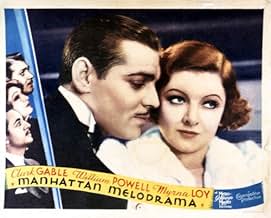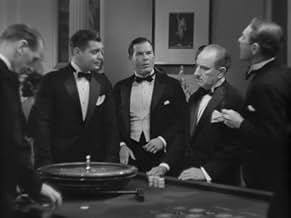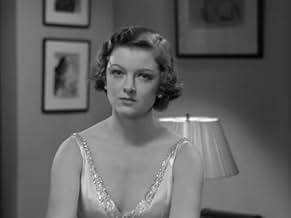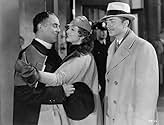VALUTAZIONE IMDb
7,1/10
5097
LA TUA VALUTAZIONE
Aggiungi una trama nella tua linguaThe friendship between two orphans endures even though they grow up on opposite sides of the law and fall in love with the same woman.The friendship between two orphans endures even though they grow up on opposite sides of the law and fall in love with the same woman.The friendship between two orphans endures even though they grow up on opposite sides of the law and fall in love with the same woman.
- Regia
- Sceneggiatura
- Star
- Vincitore di 1 Oscar
- 4 vittorie totali
Thomas E. Jackson
- Richard Snow
- (as Thomas Jackson)
Isabelle Keith
- Miss Adams
- (as Claudelle Kaye)
Oscar Apfel
- Speaker of Assembly
- (non citato nei titoli originali)
William Arnold
- Blackjack Dealer
- (non citato nei titoli originali)
William Augustin
- Detective
- (non citato nei titoli originali)
Recensioni in evidenza
From what I can gather, two main social factors led to the popularity of the gangster genre in the 1930s. The first, and most obvious, was the prevalence of criminals like Al Capone and John Dillinger, who were glorified by the national media. The second was the Great Depression, and how it impacted the traditional notion of the "American dream." Families – regardless of character or social standing – were torn apart amid the economic collapse, and no doubt many ordinary citizens contemplated crime as the route to happiness.
Films like 'Manhattan Melodrama (1934)' and 'Angels with Dirty Faces (1938)' place great emphasis on the thin line between "good" and "bad" characters, and often the central criminals are lamented as victims of circumstance. For example, James Cagney's Rocky Sullivan and Pat O'Brien's virtuous priest were separated by a matter of metres when the former is condemned to a life of crime. Circumstance, too, drives the fates of the characters in 'Manhattan Melodrama.' As children, both Jim Wade (William Powell) and Blackie Gallagher (Clark Gable) lose their parents in the burning of the steamship SS General Slocum, a true-life disaster caused by gross negligence that cost over 1000 lives. Each child responds to this injustice in their own way: Blackie rebels against the judicial system that betrayed him, whereas Jim enters law in a bid to reform it.
Whereas Warner Bros. was responsible for most of the decade's gangster films, 'Manhattan Melodrama' was produced by M-G-M, and helmed by W.S. Van Dyke (director of the first four 'Thin Man' films), whose decidedly non-gritty aesthetic style at first seems at odds with the required mood. However, it would be misleading to compare the film with the likes of 'Little Caesar (1931)' and 'Scarface (1932).' Firstly, Hollywood was now working, for the first time, under the active supervision of the Production Code Administration. Also, the studio's intentions for the film were undoubtedly geared towards a higher-brow audience, further suggested by the unintimidating, woman-friendly title.
Gable's "Blackie" Gallagher is not a paranoid hot-head like Tony Camonte or Rocky Sullivan, and, indeed, remains oddly passive throughout the film. When he does commit murders, it seems to be merely out of an obligation to genre conventions. Even when old friend Jim Wade dramatically demands his execution, Blackie looks on with a detached, amused smirk, doodling idly from the defendant's chair; the expected outburst of emotion never arrives. Instead, the story's central conflict unfolds entirely within the righteous Wade, who must choose between his personal and professional allegiances.
'Manhattan Melodrama' has achieved some notoriety for being the film that killed John Dillinger, so to speak. The fugitive bank-robber was gunned down by FBI agents as he emerged from a screening at Chicago's Biograph Theatre on July 22, 1934 (clips from the film were recently featured in Michael Mann's 'Public Enemies (2009)'). These curious circumstances can't help but make one ponder what Dillinger had thought of 'Manhattan Melodrama.' Had he, like Blackie, accepted that his time was coming to an end? Did he welcome death over a lifetime of legal persecution? At the very least, he checked out having experienced a very fine addition to the genre.
Films like 'Manhattan Melodrama (1934)' and 'Angels with Dirty Faces (1938)' place great emphasis on the thin line between "good" and "bad" characters, and often the central criminals are lamented as victims of circumstance. For example, James Cagney's Rocky Sullivan and Pat O'Brien's virtuous priest were separated by a matter of metres when the former is condemned to a life of crime. Circumstance, too, drives the fates of the characters in 'Manhattan Melodrama.' As children, both Jim Wade (William Powell) and Blackie Gallagher (Clark Gable) lose their parents in the burning of the steamship SS General Slocum, a true-life disaster caused by gross negligence that cost over 1000 lives. Each child responds to this injustice in their own way: Blackie rebels against the judicial system that betrayed him, whereas Jim enters law in a bid to reform it.
Whereas Warner Bros. was responsible for most of the decade's gangster films, 'Manhattan Melodrama' was produced by M-G-M, and helmed by W.S. Van Dyke (director of the first four 'Thin Man' films), whose decidedly non-gritty aesthetic style at first seems at odds with the required mood. However, it would be misleading to compare the film with the likes of 'Little Caesar (1931)' and 'Scarface (1932).' Firstly, Hollywood was now working, for the first time, under the active supervision of the Production Code Administration. Also, the studio's intentions for the film were undoubtedly geared towards a higher-brow audience, further suggested by the unintimidating, woman-friendly title.
Gable's "Blackie" Gallagher is not a paranoid hot-head like Tony Camonte or Rocky Sullivan, and, indeed, remains oddly passive throughout the film. When he does commit murders, it seems to be merely out of an obligation to genre conventions. Even when old friend Jim Wade dramatically demands his execution, Blackie looks on with a detached, amused smirk, doodling idly from the defendant's chair; the expected outburst of emotion never arrives. Instead, the story's central conflict unfolds entirely within the righteous Wade, who must choose between his personal and professional allegiances.
'Manhattan Melodrama' has achieved some notoriety for being the film that killed John Dillinger, so to speak. The fugitive bank-robber was gunned down by FBI agents as he emerged from a screening at Chicago's Biograph Theatre on July 22, 1934 (clips from the film were recently featured in Michael Mann's 'Public Enemies (2009)'). These curious circumstances can't help but make one ponder what Dillinger had thought of 'Manhattan Melodrama.' Had he, like Blackie, accepted that his time was coming to an end? Did he welcome death over a lifetime of legal persecution? At the very least, he checked out having experienced a very fine addition to the genre.
Clark Gable and William Powell are boyhood friends who end up on opposite sides of the law in "Manhattan Melodrama," also starring Myrna Loy. Loy is lovely here, as usual, but she doesn't really have much of a role. The film focuses on Gable and Powell. In the first scenes of the film, we see that they are orphaned and taken in by a man who has lost his son in the same fire that killed the boys' friends and family.
When we see them in present day, Gable is running an illegal gambling joint, leaning on people for money they owe, and dating the Loy character. Powell is in politics. After Loy spends some time with Powell, she decides she'd rather be with him, and eventually they marry, and Powell moves from DA to governor. Gable becomes increasingly ruthless, though the two remain devoted friends.
There are some melodramatic sections in the film, particularly the beginning and the courtroom scene which contains a very dramatic speech delivered by Powell. The acting is marvelous. Gable is likable as a slick gangster who takes things in stride. His smile lights up the screen. He really had one of the great screen presences - looks, a great voice, and dripping with charm.
But the really interesting performance is given by Powell. He's not the witty, energetic Thin Man in this, but a very committed and serious, dignified person with a lot on his shoulders. He's totally believable, and he and Gable provide great contrast. Powell's scene at the end of the film is very touching.
Enjoy the great stars and the story, but don't look for laughs.
When we see them in present day, Gable is running an illegal gambling joint, leaning on people for money they owe, and dating the Loy character. Powell is in politics. After Loy spends some time with Powell, she decides she'd rather be with him, and eventually they marry, and Powell moves from DA to governor. Gable becomes increasingly ruthless, though the two remain devoted friends.
There are some melodramatic sections in the film, particularly the beginning and the courtroom scene which contains a very dramatic speech delivered by Powell. The acting is marvelous. Gable is likable as a slick gangster who takes things in stride. His smile lights up the screen. He really had one of the great screen presences - looks, a great voice, and dripping with charm.
But the really interesting performance is given by Powell. He's not the witty, energetic Thin Man in this, but a very committed and serious, dignified person with a lot on his shoulders. He's totally believable, and he and Gable provide great contrast. Powell's scene at the end of the film is very touching.
Enjoy the great stars and the story, but don't look for laughs.
'Manhattan Melodrama' may not have the stylistic finish to it to make it a great message movie about contemporary 30s issues, but it does go a long way towards that end, and is never less than engaging.
Clark Gable is the happy-go-lucky gangster Blackie who is being tried for murder by his boyhood best friend Jim, William Powell, a D.A. who has made it to governor of New York because of a murder done by Blackie, unbeknownst to Jim. On top of it all they both love the same woman, Myrna Loy.
Despite its melodramatic but never overwrought style 'Manhattan Melodrama' has sufficient weight and substance to make itself heard 70 years after the fact. It cuts no convenient corners in the description of the governor's sad plight of having to decide whether his friend should live or die, and it paints a wonderful and believable picture of Loy's character who does what she deems best. Powell delivers a multi-layered performance that has to count amongst his best, and Gable is irrepressible and delightfully amoral as the bad guy we're all rooting for.
Recommended, but please don't judge it by the first 20 minutes which are rather slow-moving, but still entertaining.
Clark Gable is the happy-go-lucky gangster Blackie who is being tried for murder by his boyhood best friend Jim, William Powell, a D.A. who has made it to governor of New York because of a murder done by Blackie, unbeknownst to Jim. On top of it all they both love the same woman, Myrna Loy.
Despite its melodramatic but never overwrought style 'Manhattan Melodrama' has sufficient weight and substance to make itself heard 70 years after the fact. It cuts no convenient corners in the description of the governor's sad plight of having to decide whether his friend should live or die, and it paints a wonderful and believable picture of Loy's character who does what she deems best. Powell delivers a multi-layered performance that has to count amongst his best, and Gable is irrepressible and delightfully amoral as the bad guy we're all rooting for.
Recommended, but please don't judge it by the first 20 minutes which are rather slow-moving, but still entertaining.
They didn't name this "Manhatten *Melodrama* for nothing - it's classic melodrama! If you can get past the first fifteen minutes or so, what saves this film is the three leads: William Powell, Clark Gable, and Myrna Loy. As a Myrna Loy/William Powell fan, I love the whole scene from their first meeting, as she flings herself into his taxi, and he thinks she is out to wreck his career by pretending he assaulted her! Clark Gable is great as the charming bad guy, too. Of course, in this story about unpunished crime vs. betraying a friend, nobody ever considers the third way, but then it wouldn't be a melodrama anymore, would it? Anyway, if you enjoy golden oldies or any of the three main actors, it's worth watching.
Solid MGM crime drama that is best remembered today as the film John Dillinger saw just before being gunned down by federal agents. The story is a simple one about two men (William Powell, Clark Gable) who grew up together but are on opposite sides of the law. Myrna Loy also stars as the woman initially with Blackie (Gable) who falls for and marries Jim (Powell). Great director and trio of stars with fantastic chemistry elevate this above otherwise banal plot. Young Blackie is played by, of all people, Mickey Rooney! Must've been one hell of a puberty. Also of note is the song "The Bad in Every Man," sung by Shirley Ross here. The song would later be given new lyrics by Lorenz Hart and become the classic standard "Blue Moon."
Lo sapevi?
- QuizThe opening scenes depict the General Slocum disaster on the morning of June 15, 1904. The popular excursion steamer caught fire in New York's East River while transporting passengers to a picnic organized by St. Mark's Evangelical German Lutheran Church on the Lower East Side of Manhattan. With an estimated 1,021 fatalities, mostly women and children, this was New York City's single worst tragedy, in terms of lives lost, before 9/11. An incompetent, inexperienced crew was held primarily to blame for the tragedy.
- BlooperIn the cheering New York City crowds on Jim Wade's election night, supposedly in November 1925, theatre marquees are promoting 1933 films, including MGM's Pranzo alle otto (1933) and Argento vivo (1933) with Michael Strogoff (1910).
- Citazioni
Edward J. 'Blackie' Gallagher: Die the way you lived, all of a sudden, that's the way to go. Don't drag it out.
- Versioni alternativeAlso available in a computer colorized version.
- ConnessioniFeatured in David O. Selznick: 'Your New Producer' (1935)
I più visti
Accedi per valutare e creare un elenco di titoli salvati per ottenere consigli personalizzati
- How long is Manhattan Melodrama?Powered by Alexa
Dettagli
- Data di uscita
- Paese di origine
- Lingua
- Celebre anche come
- Manhattan Melodrama
- Luoghi delle riprese
- Aziende produttrici
- Vedi altri crediti dell’azienda su IMDbPro
Botteghino
- Budget
- 355.000 USD (previsto)
- Tempo di esecuzione
- 1h 33min(93 min)
- Colore
- Proporzioni
- 1.37 : 1
Contribuisci a questa pagina
Suggerisci una modifica o aggiungi i contenuti mancanti


























